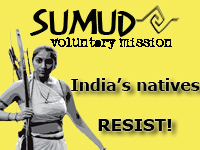
First of all in the mineral-rich belt in the south-east the Indian government awarded vast swathes of land to mining companies and heavy industries with contracts worth dozens of billions of Euros. They come to exploit the natural resources leaving little more than pollution and depleted resources. On the land they wish to appropriate, however, happen to live people mostly without property titles – the Adivasi, Hindi for native people. They are the poorest of the poor, excluded from caste society like the untouchables (Dalits), but differently to them living in formerly remote areas, in the jungles, which provided their livelihood in subsistence.
Thus for business there is only one solution: drive them off their lands like its predecessor evolving capitalism did with the European peasants and the American natives. In the last decade hundreds of thousands of Adivasis have been chased away not only destroying their livelihoods but bringing their ancient culture to the brink of extinction.
But resistance keeps growing. Mega-projects are pending since the Adivasis refuse to evacuate their lands and other sections of the people are joining in to defend their livelihoods against the predatory appetites of the corporate houses. When cheap promises in the style of the white settlers in North America do no more work, brute force is being applied. In return peaceful protests turn into violent self-defence. The Maoist armed movement is rapidly spreading and evolved as the leadership of the Adivasis at least in the hot spots of the conflict. The government created an irregular militia called Salwa Judum (purification hunt) based on the privileged strata of Adivasi society which has been massacring the resisting people, burning down their villages and forcing them to flee. Hundreds of thousands displaced Adivasis has been interned in camps. Eventually the Adivasis flew also from the camps into the jungle nurturing the ranks of the Maoists. By 2009 Salwa Judum nearly decayed and. Several para-military forces assisted and trained by Indian Army moved in calling their war against the native people Green hunt.
Meanwhile the double impact of globalist intrusion and popular resistance irreversibly changed Adivasi society. While opposing capitalist development as hailed by the upper classes and the global elite they go for a development through and for the popular masses themselves. At the most remote places collective agricultural and handicraft projects are initiated. For the first time education in Adivasi languages is being provided by the Maoists forcing the government to also embark on that road. People’s power administration is being initiated giving women the possibility to break out from their traditionally inferior role.
Also other sectors of the poor and oppressed are following suit as capitalist globalisation is a comprehensive threat. The example of Posco, a South Koran-American heavy industry corporation which is planning the hugest single investment with some ten billion Euros, illustrates the general situation. Posco plans to build a steel plant together with a deep sea port and iron ore mining in Odisha, on the east coast. While the government is promoting the project as development eventually enhancing the well-being of all Indians the popular movement is arduously opposing it. The Adivasis who fight the mines on their land, the fishermen as the port will destroy their fishing grounds, the peasants without land titles whose livelihoods are being raised to the ground and the people in general fearing that the industries will dry out the scarce water resources. They counterpoise their own popular development against the one by big business.
As this struggle is being intensified by the global financial crisis the government is branding any opposition as terrorism; be it by the Muslim minority in the visor of state sponsored Hindu chauvinism, be it the national liberation movements in Kashmir or the northeast, be it the Adivasis or the Dalits. Employing the Western paradigm of the war on terror the self-proclaimed largest democracy in the world is prosecuting all those who dare to use the democratic rights they are formally entitled to. Even the most important contemporary writer of India, Arundhati Roy, who visited the Adivasi armed resistance to report on their motivation, is threatened with prison.
As Sumud voluntary association we want to concretely and practically support the just struggle of the Indian natives for survival responding to their general call for help in autonomous popular development projects. Not only because we have a moral duty to go against the repetition of colonial genocide committed by Western capitalist civilisation in all parts of the world. Also because in the last instance we are also affected by globalisation and need to unify our forces with the global resistance.
Access to the Adivasi resistance areas as large as entire European states is, however blocked by the army. Therefore our friends and partners from “ADIVASI DRUM”, a collective community organisation operating in the southern state of Andhra Pradesh, proposed to use a mobile medical project at the fringes of the conflict zones. Whether this is be possible or not depends also on our capacity to launch a political campaign both in Europe as well as in India.
In the beginning of 2011 we plan to send a small delegation in order to deliver the first aid as well as to test on the ground the possibilities of a common activity together with the teams of Adivasi Drum. In the future we intend to let the project grow.
What we need:
• Medical personnel including doctors ready to work together with local staff.
• Film, photo and journalistic coverage.
• Several thousand Euros of donations in order to purchase locally produced medication.
Volunteers can apply at info@sumud.org
Donations can be transferred to
Sumud
Banca Popolare Etica
IBAN: IT19U0501802800000000127032
BIC: CCRTIT2T84A